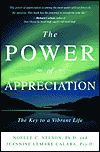
(Editor's Note: While this article is written for couples, its suggestions can also be adapted to relationships with family, co-workers, acquaintances, etc.)
A relationship is something to appreciate. A relationship allows you to share experiences. It lets you see yourself through someone else's eyes, and if that can be annoying at times, it is also a wonderful opportunity for self-awareness and growth. A relationship provides companionship, affection, entertainment, support, and caring. It allows you to share responsibilities and combine your abilities and assets of all types: mental, physical, emotional, and financial. All of these characteristics can be valued and cherished. Grow the love in your life by appreciating your relationship itself.
For example, value how wonderful it is to wake up and snuggle in someone's sleepy arms in the morning. Cherish how good it feels to lie, still half-asleep, and recount your dream to a willing pair of ears. Value how precious it is to have dinner with someone who cares about you and whether you had a nice day. Appreciate these special things and the many more that your relationship affords you.
Like attracts like. As you increase your vibration of appreciation for your relationship, aspects of the relationship to appreciate will increase.
Appreciating the Relationship Itself
As you appreciate the relationship itself, you start looking at it differently. The relationship itself acquires more meaning and importance. You become more willing to make the effort to keep it growing.
If you find that you hold negative attitudes about marriage or relationship, even jokingly, weed them out -- expressions like "the old ball and chain" don't belong in an appreciator's vocabulary. Negative attitudes interfere with the positive vibration of appreciation of your relationship. They devalue it, however subtly, and entrain a vibration of unhappy feelings.
Sometimes negative attitudes are evidenced in what is not spoken. You can fail to appreciate your relationship simply by not saying anything positive, as was commented on by Kim, an Appreciators Group member: "I think of the woman who's been married twenty years, and asks her husband if he loves her and he says, 'I married you, didn't I?' He hasn't said the words 'I love you' since, but she's supposed to know that she's appreciated because he married her and he's still there." Such an attitude doesn't support or enhance a relationship. Appreciation is at its most powerful when it is expressed overtly, as well as in your heart.
Spend time every day appreciating your relationship. Value some specific aspect of it that has significance for you, and be grateful for it. Put all your heart into your appreciation, even if only for a minute. That intensely focused moment of appreciation, repeated on a regular basis, will wondrously nourish the love in your relationship. The feeling you generate is addictive, as Dan, an AG member, noted: "I find that I am actually grateful for the opportunity to appreciate my wife, so it's almost like this double-bubble kind of a thing. And I think that's one of the strongest things I've gotten in our relationship -- the opportunity to really appreciate the presence of someone like her:
Appreciating in the Face of Infidelity
But what about the really nasty things that can happen in a relationship? If your spouse is unfaithful, you can't very well say, "I appreciate your infidelity." In no way do you value, nor are you grateful for their breaking their marital promise. You're more likely to value and be grateful if something painful descends upon their head -- like the ceiling, or a thunderbolt, or a frying pan at the very least!
But appreciation still has an important part to play. If you wish to stay in the relationship, you can appreciate your mate's infidelity as a wake-up call, or as an opportunity to take a good look at what your marriage lacks, or how both of your needs and desires have changed, or whether your communication is flawed. Dealing with the source of an infidelity may lead to a stronger, happier relationship once the dust settles.
If, on the other hand, infidelity is the final straw in a host of problems you've been unable to deal successfully with, you can appreciate your new resolve to leave the marriage. You can value and be grateful for what you have learned while in this relationship. You can begin to appreciate the good life that you will create for yourself.
In both scenarios, and others like them, appreciation changes how you view an unhappy situation, and how you respond to it. Appreciation helps you steer clear of blame and fault-finding, which get in the way of problem solving. Appreciation helps you avoid the pitfalls of prolonged self-pity or victimhood, which keep you stuck on the problem rather than seeking the solution. Appreciation empowers you to seek out resources that you need to resolve the situation and move on.
Antidote to Power Struggles
 Power struggles result from a "my way or the highway" mentality. They ensue when one or both partners refuse to value, much less be grateful for, the other's obstinate refusal to see things the partner's way. You want the windows open at night, she wants them shut: the battle for power rages as you open them, she shuts them, you open them, she shuts them, all night long.
Power struggles result from a "my way or the highway" mentality. They ensue when one or both partners refuse to value, much less be grateful for, the other's obstinate refusal to see things the partner's way. You want the windows open at night, she wants them shut: the battle for power rages as you open them, she shuts them, you open them, she shuts them, all night long.
If you tolerate open confrontation, the battle is waged dramatically, accompanied by yelling and screaming. If you don't tolerate confrontation, the struggle goes on passive-aggressively: you open the window on your way to the bathroom, she closes it as soon as she thinks you're asleep; you open it when you wake up in the night, she senses your movement, waits again for signs of slumber, then shuts it once more. In either scenario, each of you clings tenaciously to "my way."
Appreciation can dissolve the whole issue of power and make it irrelevant. When you value your partner's right to his or her desires, you don't want to squash them, either overtly or covertly. When you value your own rights, you're equally unlikely to allow your partner to squash your desires. When you value both your and your partner's desires, you can say, "I appreciate what you want, as I appreciate what I want. Let's get creative, let's have fun seeing how we can accommodate both of our wishes." There is no longer a power struggle; there is only a problem to be mutually resolved.
Cynthia, an Appreciators Group member, speaks of the power struggle she and her husband engaged in for years:
We used to have the "remote" fight every night; you know, who gets to control the remote and therefore which show the other one will be forced to watch. It seems so petty! But there we were, hashing it out every night, with one or the other of us either stomping out of the room or making rude comments throughout the show.
When we decided to try appreciating our way through this, we ran up against an immediate brick wall. I couldn't appreciate the World Wrestling Federation under any circumstances, and home decorating shows were the bane of my husband's existence.
So we decided to start by just appreciating that each of us had different, equally valid preferences. Deep breath. After some squabbling over "equally valid" we were able to accept that concept, and then decided to go for the gold: appreciating our different remote styles. I'm a "hit the remote once to find your show and that's it" type, and my husband is a "remotes were made for endless continual channel surfing" type.
We realized there were actually only a few shows each of us really cared about, so we decided to honor those show times as "surf-free zones." If two shows were on at the same time, we took turns watching our show live, and watching the taped version later. For the rest, we alternated nights as to who held the remote. This ridiculously complicated system turned out to work very well for us.
Mind you, the only thing that makes it work is our fierce determination to appreciate both our own choices and each other's choices -- which sometimes is a challenge. I mean when was the last time you tried to watch a Seinfeld rerun chopped up with moments from three other shows -- and much less appreciate something about it? What cracks me up, is that after all this, we're both watching TV less and either reading or talking more, and having a lot more fun just enjoying time together. I guess when the power-struggle aspect got taken out of the equation, TV became a lot less important. Who would have thunk it...
Appreciation Short-Circuits Abuse
Another kind of power struggle is, in truth, not a struggle at all, but outright domination. In an abusive relationship, one partner imposes his or her will on the other, and will accept nothing less than total submission. Control and coercion may involve emotional, mental, and physical abuse.
Domination cannot exist where appreciation is the governing principle. If your partner values and is grateful for your very existence, and values and is grateful for the unique individual that you are, he or she cannot seek to control you, for controlling you violates your ability to have your own unique desires, boundaries, and positions.
When you appreciate another person, you cannot and would not want to impose your will on that person. Similarly, when you appreciate yourself -- your desires, boundaries, and positions -- you cannot accept being dominated, for it violates who you are. When you appreciate yourself, even if you find you have been seduced into a relationship of domination, you will not stay.
Jealousy and Possessiveness
Less obvious forms of control are jealousy and possessiveness. When you love someone, that person becomes precious and valuable to you. You fear losing him or her, and feel jealous or possessive when that fear is activated. This is a natural consequence of loving, and not a problem.
It is a problem, however, when the fear of losing the mate is translated into controlling behavior. For example, you forbid your mate to see so-and-so, or you check up on him; where he has been, with whom, and for how long. Perhaps you go everywhere with your mate lest he catch another's eye. Eventually you achieve the exact opposite of what you hoped for. Far from binding your mate more closely to you, attempting to control him stimulates your mate's desire for freedom. Either he will pine away, depressed at the very core from lack of liberty, or leave to recapture it.
When you appreciate your mate, however, that appreciation increases your partner's desire to be with you. Think of it: when someone values you, sees your true worth, and tells you how much he appreciates your intelligence, individuality, sense of humor, quirky ways, or sweet smile, do you want to leave? Quite the contrary, the more someone makes no effort to chain you, the freer you are to enjoy his appreciation of you, and the more likely you are to want to stick around.
Reprinted with permission of the publisher,
Beyond Words Publishing, Inc. ©2003. www.beyondword.com
Article Source
The Power of Appreciation: The Key to a Vibrant Life
by Noelle C. Nelson & Jeannine Lemare Calaba.
 Research confirms that when people feel appreciation, good things happen to their minds, heart, and bodies. But appreciation is much more than a feel-good mantra. It is an actual force, an energy that can be harnessed and used to transform our daily life—relationships, work, health and aging, finances, crises, and more. Based on a five-step approach to developing an appreciative mindset, The Power of Appreciation will open your eyes to the fabulous rewards of conscious, proactive appreciation.
Research confirms that when people feel appreciation, good things happen to their minds, heart, and bodies. But appreciation is much more than a feel-good mantra. It is an actual force, an energy that can be harnessed and used to transform our daily life—relationships, work, health and aging, finances, crises, and more. Based on a five-step approach to developing an appreciative mindset, The Power of Appreciation will open your eyes to the fabulous rewards of conscious, proactive appreciation.
Info/Order this paperback book and/or download the Kindle edition.
About the Authors

 Dr. Noelle C. Nelson is a noted author, therapist, and trial consultant. Her books include Everyday Miracles and Winner Takes All. Her syndicated "The Problem Solution Lady" radio program is heard on radio stations around the country. Visit her website at www.noellenelson.com
Dr. Noelle C. Nelson is a noted author, therapist, and trial consultant. Her books include Everyday Miracles and Winner Takes All. Her syndicated "The Problem Solution Lady" radio program is heard on radio stations around the country. Visit her website at www.noellenelson.com
Dr. Jeannine Lemare Calaba is a licensed clinical psychologist whose practice focuses on trauma and health psychology.
More books by Noelle Nelson
at InnerSelf Market and Amazon



























